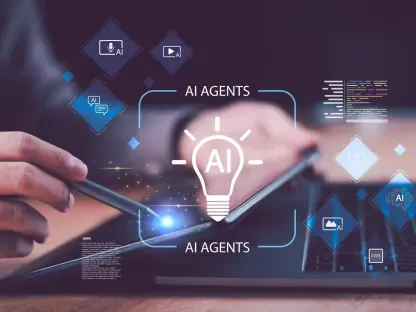In today’s fast-paced digital age, the software industry is on the brink of a transformative shift with the increasing integration of artificial intelligence (AI). This evolution is no longer confined to theory but is actively reshaping how developers conceive and execute projects. AI’s impact on the Software Development Life Cycle (SDLC) has presented compelling opportunities to address persisting challenges like resource constraints, complex customizations, and rapid delivery expectations. As businesses are compelled to adapt, the pivotal question remains: how can AI redefine traditional software workflows while maintaining quality and innovation?
Current State of AI in Software Development
Adoption Trends and Statistics
Recent trends reveal a robust movement toward AI adoption in software development. Studies show that in the past year, AI-driven tools have seen a double-digit growth rate, particularly within the realm of coding and application design. This surge is supported by data reflecting increased investment in AI technologies, with many organizations reporting improved project timelines and code efficiency. Reports from industry analysts indicate that AI-assisted software development platforms, like the OutSystems Developer Cloud, are instrumental in this widespread adoption, allowing for rapid prototyping and deployment.
Real-World Applications and Case Studies
In practice, AI is revolutionizing software development through applications such as OutSystems Mentor. This AI assistant exemplifies how generative AI and machine learning are being harnessed to transform traditional coding processes. For instance, it can generate entire applications with minimal human input, a feat that major tech firms like IBM and Amazon are keen to explore. Case studies showcase successful integrations where businesses have achieved reductions in development time and increased code quality, validating AI’s practical potential in driving innovation across the industry.
Expert Insights and Industry Opinions
Leading authorities in technology emphasize the transformative potential of AI, but they also caution against overlooking its associated challenges. Experts highlight the need for responsible AI deployment, emphasizing the risks of ungoverned AI solutions that may introduce security vulnerabilities and technical debt. Thought leaders agree that, despite these challenges, the benefits of implementing AI-driven processes, such as enhanced efficiency and innovative capability, far exceed the risks if managed appropriately. Industry professionals predict that the next few years will see a shift towards more structured AI governance models to ensure that AI integration is both effective and secure.
Future Prospects and Implications
Looking ahead, the integration of AI into software development is poised to introduce significant advances, including autonomous coding and intelligent systems capable of handling complex tasks independently. These developments are expected to yield efficiency gains, streamline workflows, and foster innovative possibilities that extend well beyond current capabilities. However, challenges such as ensuring data privacy and maintaining control over AI processes remain. Broad industry implications suggest AI will not only enhance competitiveness but also necessitate new strategies for workforce adaptation, highlighting the need for ongoing education and ethical AI practices.
Conclusion
In synthesizing the current state and future prospects of AI in software development, it becomes clear that AI has shifted from being a forward-looking concept to a critical element in today’s software ecosystem. As the trend continues to evolve, businesses that effectively leverage AI will likely surpass those dependent on traditional methodologies, driving the next wave of technological advancement. While the journey of AI integration poses its share of challenges, embracing this transition represents a pathway to sustainable success in an increasingly competitive landscape.









